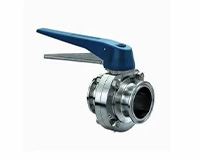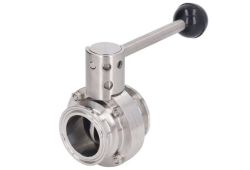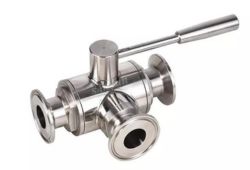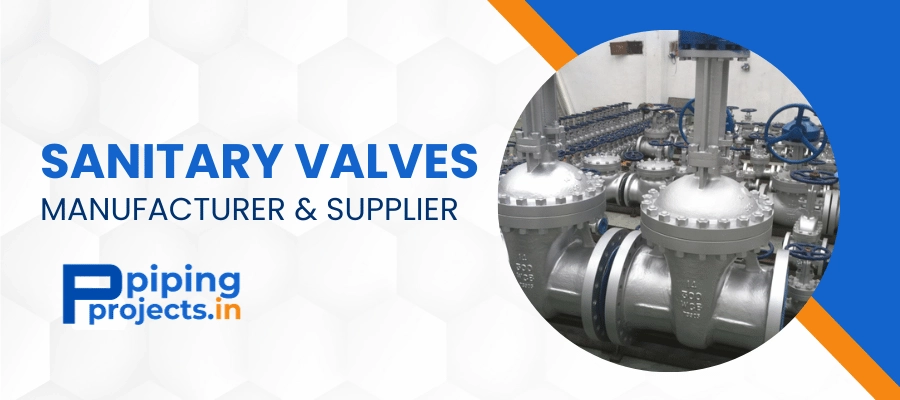Piping Projects India is one of the leading Sanitary Valves Manufacturer in India. These valves are crucial in connecting Piping Projects and regulating the media flow rate in a piping system while maintaining hygiene standards. Typically, austenitic grades 304 or 316 stainless steel alloys produce sanitary valves. Piping Projects India is a top Sanitary Valves Supplier in India.

Sanitary Valves




Trusted
Supplier

Genuine
Product
Easy
purchase
WHAT IS SANITARY VALVE?
Hygiene or sanitary valves facilitate the connection between piping systems and regulate the flow velocity of the media within the system. Typically, these valves are constructed using austenitic grades 304 or 316 stainless steel alloys. A sanitary valve is a specialized valve engineered explicitly for applications where maintaining impeccable levels of hygiene and preventing contamination are paramount. These valves have extensive indiage in food and beverage, pharmaceuticals, biotechnology, and cosmetics industries.
WHY ARE SANITARY VALVES IMPORTANT?
Sanitary valves play a vital role in industries that deal with the processing, handling, and regulating of fluids and gases, particularly in sectors where maintaining hygiene and product purity is of utmost importance. These valves hold significant value for several vital reasons. Primarily, they are designed to adhere to strict sanitary and hygienic standards, making them indispensable in food and beverage, pharmaceuticals, biotechnology, and cosmetics, where preventing product contamination is crucial.
These valves are constructed with smooth, crevice-free surfaces, minimizing the risk of bacterial accumulation and ensuring effortless cleaning and sterilization, thereby upholding the integrity of the product. Furthermore, sanitary valves provide precise control over substance flow, essential for maintaining product quality, process efficiency, and compliance with regulations. In essence, their utilization guarantees the safety and quality of products in critical industries, rendering sanitary valves indispensable for upholding high hygiene and product purity standards.
WHAT MATERIALS ARE USED IN SANITARY VALVES?
We are a leading Sanitary Valves Manufacturer in India, Our Sanitary valves are commonly fabricated from materials that conform to rigorous standards of hygiene and cleanliness and offer robustness and corrosion resistance. Material selection is contingent upon the particular application and the nature of the fluids being processed. Some of the frequently employed materials in the construction of sanitary valves are:

Ready to Purchase this Product Today?
Contact us now for quick help.
Piping Projects India is an esteemed Sanitary Valves Manufacturer, is dedicated to providing with reliable, top-notch Sanitary Valves. Here are the specifications for Sanitary Valves.
| Sanitary Valves | Specifications |
|---|---|
| Connection Type | Tri-clamp, Weld and Clamp Ends |
| Actuator Type | Manual, Pneumatic, Electric |
| Pressure Rating | Varies according to valve type and application |
| Grade | |
| Stainless Steel | 200 Series - 201, 202, 205. 300 Series 301, 302, 303, 304, 304L, 308, 309, 309S, 310, 310S, 314, 316, 316L, 316TI, 317, 317L, 321, 347. 400 Series 405, 409, 429, 430, 430F, 430FSe, 434, 436, 442, 446, 403, 410, 414,416, 416Se, 420,420F, 422, 431, 440A, 440B, 440C. 500 Series - 501, 502. 600 Series - 630 (17-4 PH). |
| Carbon Steel | ASTM A106 Gr. A , B & C API 5L Gr. A / B, X42 ,X52 ,X60 ASTM A 53 Gr. A/B |
| Titanium | Titanium 6-4, Gr 1, Gr 2, Gr 3, Gr 4, Gr 5, Gr 7, Gr 9, 5-2.5, 6-2-4-2, 6-4 ELI, 6-6-2. |
| Hastelloy | C22, C276, X, B-2. |
| Monel | 400, K500. |
| Nickel Alloy | Nickel 200 Nickel 201, Alloy 20, Alloy 286, Alloy 218 (Nitronic 60), Nitronic 50 (XM-19). |
| Cupro Nickel | Cu 90-10 (C70600,CW352H), Cu 70-30 (C71500, CW354H). |
| Inconel | 601, 625, 660A, 718, X-750, 825, 925, 608. |
| Duplex / Super Duplex | D S31803, D S32205, SD S32750, SD S32760, SD S32950. |
| Chromium Molybdenum Steel | A387 Gr 2, A387 Gr 12, A387 Gr 11, A387 Gr 22, A387 Gr 22L, A387 Gr 7, A387 Gr 21, A387 Gr 21L, A387 Gr 9, A387 Gr 91. |
| Nichrome Alloy | CrNi 20/80. |
| Copper | ASTM B1, ASTM B2, ASTM B3, ASTM B152, ASTM B124, ASTM B133. |
| Brass | Alloy 260, Alloy 272, Alloy 330, Alloy 353, Alloy 360, Alloy C48200 - C48500, Alloy 464. |
| Bronze | Alloy 954, Alloy 933. |
| Case Hardening Steels | 10C4, 15C8, 15Cr3, 16Mn5Cr4, 20MnCr5, 15Ni5Cr4Mo1, 15Ni5Cr4Mo2, 20Ni7Mo2, 20NiCrMo2, 14CrNi6. |
| En Series | En8, En9, En19, En24, En30B, En31, En36, En45, En47, En48. |
| Mild Steel | Sae 4118, Sae 4120, Sae 4120, Sae 4130, Sae 4135, Sae 4137, Sae 4140, Sae 4142, Sae 4145, Sae 4147, Sae 4150, Sae 4161, Sae 8620. |
Piping Projects India is a leading Sanitary Valves Supplier in India. Our range of products is available in a multitude of diameters, catering to a wide range of utility and intended purposes.

Ready to Purchase this Product Today?
Contact us now for quick help.
What Are The Classification Of Tri Clamp Valve?

Advantage Of Sanitary Valves
There are Several advantages of using Sanitary Valves. As we are a top Sanitary Valves Manufacturer in India. Our Sanitary Valves use for various application because it have several advantages some of the advantages mention below.
How To Install Tri Clamp Globe Valve?
In order to properly install a tri-clamp globe valve, it is essential to first determine the size of the pipeline and the valves to ensure accurate alignment. Following this, a comprehensive inspection of the valves, threads, and the pipeline must be carried out to identify any foreign particles that could obstruct the flow. To ensure a leak-proof joint, a thread-sealing compound should be applied to the pipe. The pipe and valves should then be aligned and securely fastened onto the pipe using a wrench. Once the installation is complete, it is crucial to test the valves for potential leaks. Additionally, a gasket should be utilized to establish a sealed joint.
How Does A Sanitary Globe Control Valve Work?
The stainless steel sanitary globe valves consist of a spherical body divided into two halves by an internal baffle. Within the body is a seat opening where a movable plug, known as a disc, can be inserted to enable the valves to be shut or closed. This plug is connected to a stem, operated by a handwheel in manual valves through a screwing mechanism. In automated sanitary globe control valves, smooth stems are preferred over threaded ones. An actuator assembly can be utilized to facilitate the valve's opening or closing.
Things To Consider When Buying Sanitary Valves From Manufacturer In India

Ready to Purchase this Product Today?
Contact us now for quick help.





Supplying Sanitary Valves to Following Cities:
Piping Projects India is a leading Sanitary Valves Manufacturer in India. We proudly supply high-quality Sanitary Valves to major cities in India. We are known in the market as the India’s leading Sanitary Valves Supplier for a long time.
| Cities We Supply | |||||||||
|---|---|---|---|---|---|---|---|---|---|
| Raigad | Pune | Nashik | Nagpur | Ahmednagar | Mumbai | ||||
| Ahmedabad | Bangalore | Chennai | Vadodara | Ludhiana | Delhi | ||||

Get in Touch